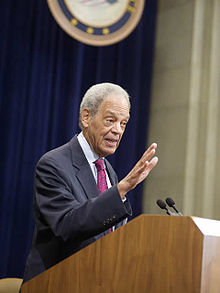Roger Wilkins
| Roger Wilkins | |
|---|---|
 |
|
| 15th United States Assistant Attorney General | |
|
In office 1966–1969 |
|
| President | Lyndon B. Johnson |
| Preceded by | Mabel Walker Willebrandt (1929) |
| Succeeded by | Wesley Pomeroy |
| Personal details | |
| Born |
March 25, 1932 Kansas City, Missouri, U.S. |
| Died | March 26, 2017 (aged 85) Kensington, Maryland, U.S. |
| Cause of death | Complications from dementia |
| Political party | Democratic Party |
| Spouse(s) | Patricia King (until his death) |
| Residence | Washington, D.C., U.S. |
| Alma mater | University of Michigan |
| Occupation | Civil rights activist, professor, historian and journalist |
Roger Wilkins (March 25, 1932 – March 26, 2017) was an African-American civil rights leader, professor of history, and journalist.
Wilkins was born in Kansas City, Missouri, on March 25, 1932, and grew up in Michigan. He was educated at Crispus Attucks Elementary School in Kansas City, Missouri, then Creston High School in Grand Rapids, Michigan. Wilkins received his undergraduate degree in 1953 and LL.B. in 1956 both from the University of Michigan, where he interned with the NAACP and was a member of the senior leadership society, Michigamua.
Wilkins worked as a welfare lawyer in Ohio before becoming an Assistant Attorney General in President Lyndon B. Johnson's administration at age 33, one of the highest-ranking blacks ever to serve in the executive branch up to that time.
Roger Wilkins was sworn in as Director of Community Relations Service on Friday 4 February 1966 in a ceremony at The White House as per page 2 of President Johnson's Diary for that day.
Leaving government in 1969 at the end of the Johnson administration, he worked briefly for the Ford Foundation before joining the editorial staff of the Washington Post.
Along with Carl Bernstein, Herbert Block ("Herblock"), and Bob Woodward, Wilkins earned a Pulitzer Prize in 1973 for exposing the Watergate scandal that eventually forced President Richard Nixon's resignation from office. He left the Post in 1974 to work for the New York Times, followed five years later by a brief stay at the now-defunct Washington Star. In 1980 he became a radio news commentator, working for National Public Radio (NPR).
...
Wikipedia
